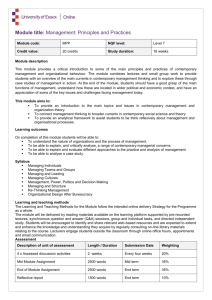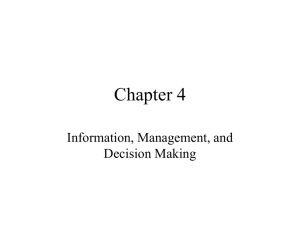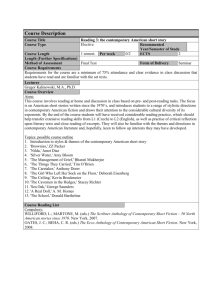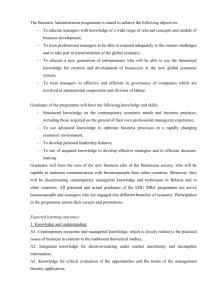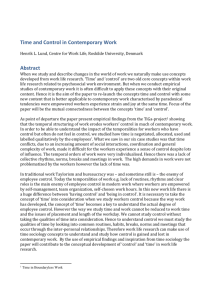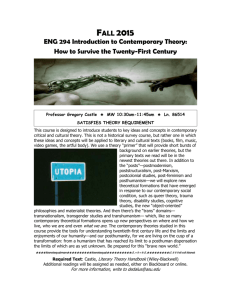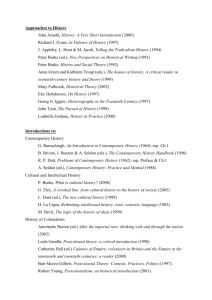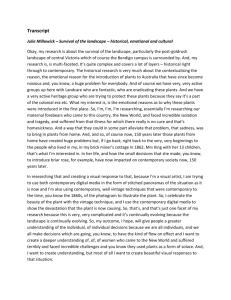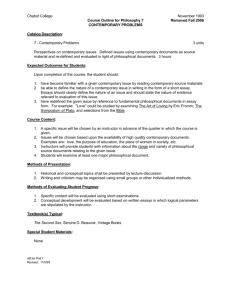Project Management: A Managerial Approach
advertisement
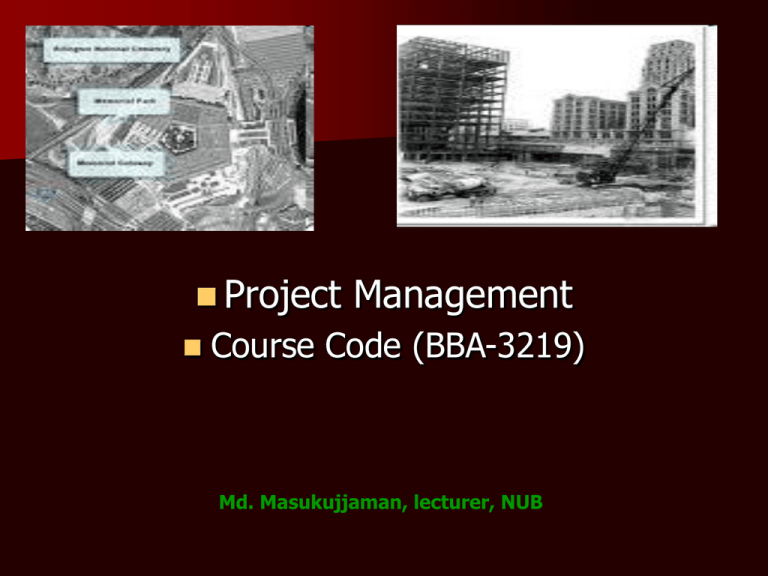
Project Management Course Code (BBA-3219) Md. Masukujjaman, lecturer, NUB Project Management: A Managerial Approach Chapter 1 – Projects in Contemporary Organizations Books….. Text Books Jack R. Meredith, Samuel j. Mantel, Jr. Project Management, A managerial Approach, Fifth Edition, Wiley, 2003 Reference books Maylor, H. Project management, Third Edition, Pearson Edition Pte.Ltd.2004 Overview After studying this chapter we will know…. Project Project Project Project & Project Criteria Management Aspects Management Growth Factors Life Cycle What is a Project? Project Defined –A complex, nonroutine, one-time effort limited by time, budget, resources, and performance specifications designed to meet customer needs. The Definition of a “Project” Must make a distinction between terms: Program - an exceptionally large, long-range objective that is broken down into a set of projects – “A group of related projects managed in a coordinated way to obtain benefits and control not available from managing them individually.”* – Program managers oversee programs and often act as bosses for project managers. Task - set of activities comprising a project Work Packages - division of task Work Units - division of work packages A specific, finite task to be accomplished Project Management A Working Definition Project: – A problem with a known solution scheduled for completion—unique and non-routine activities Project Examples.. Jamuna Multi-purpose Bridge. Illiteracy eradication project. Poverty Alleviation Project. Vasantek Rehabilitation Project (BRP). IT project: – A help desk or technical worker replaces laptops for a small department. – A small software development team adds a new feature to an internal software application. – A college campus upgrades its technology infrastructure to provide wireless Internet access. Major Characteristics of a Project – Has an established objective. – Has a defined life span with a beginning and an end. – Requires across-the-organizational participation. (Cross functional activity) – Involves doing something never been done before. (Non-routine) – Has specific time, cost, and performance requirements. – Involves uncertainty. Programs versus Projects Program Defined –A series of coordinated, related, multiple projects that continue over an extended time and are intended to achieve a goal. –A higher level group of projects targeted at a common goal. –Example: Project: completion of a required course in project management. Program: completion of all courses required for a business major. Project Management: – The science and art of solving the problem within predetermined time and resource parameters – Shouldering just enough risk to escape with your career intact!!! The Challenge of Project Management The Project Manager –Manages temporary, non-repetitive activities and frequently acts independently of the formal organization. Marshals resources for the project. Is linked directly to the customer interface. Provides direction, coordination, and integration to the project team. Is responsible for performance and success of the project. –Must induce the right people at the right time to address the right issues and make the right decisions. The Importance of Project Management Factors leading to the increased use of project management: –Compression of the product life cycle –Global competition –Knowledge explosion Importance contd… – Corporate downsizing – Increased customer focus – Rapid development of Third World and closed economies – Small projects that represent big problems Advantages of Using Formal Project Management Better control of financial, physical, and human resources. Improved customer relations. Shorter development times. Lower costs. Higher quality and increased reliability. Higher profit margins. Improved productivity. Better internal coordination. Higher worker morale (less stress). Why Project Management? Companies have experienced: – Better customer relations – Shorter overall delivery times – Lower costs and higher profit margins – Higher quality and reliability – Higher worker morale Why (not) Project Management? Companies have also experienced some negatives: – Greater organizational complexity – Increased likelihood of organizational policy violations – Higher costs – More management difficulties – Low personnel utilization The Project Life Cycle Stages of a Conventional Project: – Slow beginning – Buildup of size – Peak – Begin a decline – Termination The Project Life Cycle The Project Life Cycle Stages of a Conventional Project: – Slow beginning – Buildup of size – Peak – Begin a decline – Termination Project Management Life Cycle Planning Implementation Delivery Level of effort Definition 1. Goals 2. Specifications 3. Scope 4. Responsibilities 5. Teams 1. WBS 2. Budgets 3. Resources 4. Risks 5. Schedule 1. Status reports 2. Change Orders 3. Quality Audits 4. Contingencies 1. Train user 2. Transfer documents 3. Release resources 4. Reassign staff 5. Lessons learned The Project Life Cycle Unlike the more conventional life cycle, continued inputs of effort at the end of the project produce significant gains in returns Projects in Contemporary Organizations Figure 1-3 Projects in Contemporary Organizations Figure 1-4 Projects in Contemporary Organizations Figure 1-5 Projects in Contemporary Organizations Figure 1-6 THAT’S ALL TODAY
